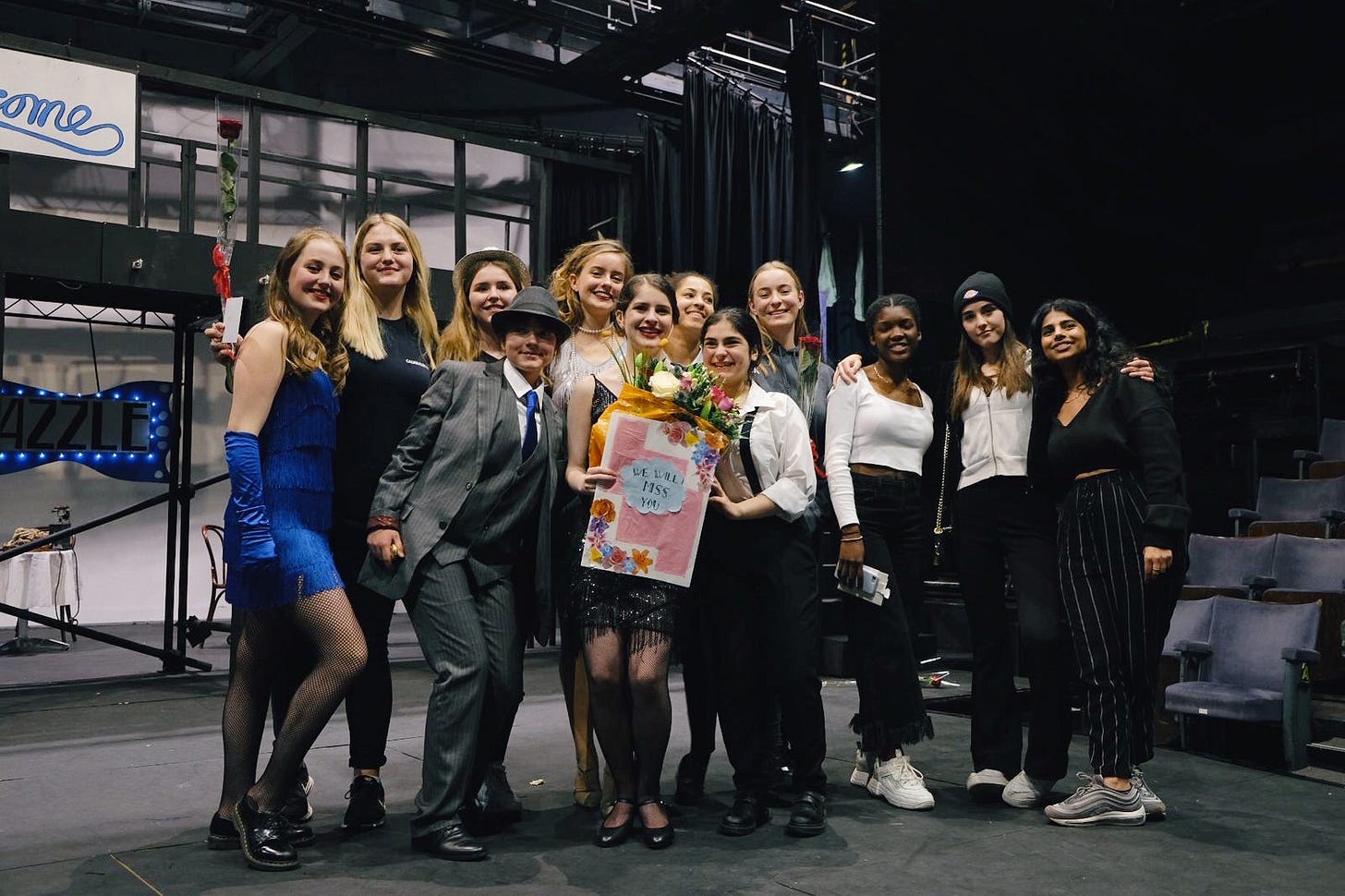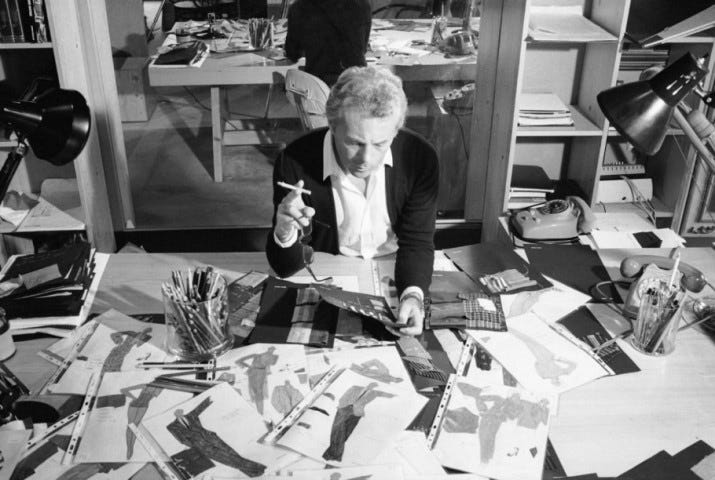I Didn’t Study Fashion (And You Don’t Have To Either)
Why further education isn’t the be-all and end-all
This Editor’s Letter is, and will remain, free to view by all, however, future pieces will be available to paid subscribers only.
Editor’s Letter, 21/11/2022 by Molly Elizabeth Agnew
When I was in year six, my form teacher made every student in my class draw our roadmap towards our dream careers on an A3 piece of coloured card. I took my pink rectangle of paper, my coloured pens and pencils and got to work studiously, knowing precisely what I was going to create. The stairway that I drew presented the clear pathway I was determined to walk. Get 10 GCSEs, ace my Drama A-levels, get accepted into LAMDA, the prestigious London drama school, and then, of course, become an award-winning theatre, film and tv actress. Only one of these steps was achieved.
University had never been on my radar, it would be a practical and energetic drama school for me where I could hone my theatrical talents and skills physically instead of writing long and tedious essays about Stanislavsky. I was prepared to be rejected on my first attempt at enrolling, knowing that many attend drama school two years after leaving the sixth form (it’s a competitive industry.) And yet, the day that my mum and I confirmed to my beloved high school that I would, after weeks of back and forth with doctors and teachers, be dropping out, I longed for a tertiary educational experience that would never come my way. Even though I somehow, and rather miraculously, emerged from the haze that is GCSEs with 10 qualifications, it was clear that something was seriously wrong. I’d been unable to revise for any of the exams. My incapacity to stay upright and retain even a modicum of information along with an increase in constant physical pain was pardoned by my GP as the simple teenage girl sitting exams stress.
Just four months later, after a summer of invasive medical testing and resilient advocation by my mum I was, finally, diagnosed with Ehlers-Danlos Syndrome, Postural Orthostatic Tachycardia Syndrome and, although this was the least of my worries, coeliac disease. It was agreed upon, with my school, that I would drop two of my A-level subjects, focusing only on Drama, until performing as Velma in the school’s production of Chicago. The closing night would be my last day as a student. What followed was several years of horribleness that, quite frankly, need going through with a therapist before I can touch on them publicly.
All this rambling has a meaning, I promise! Founding Eternal Goddess in the June of 2020 was a way to engage my brain in a topic I have always adored and yet never found the correct outlet for. The opportunity to talk at length about clothing and its substantial impact on our socio-economic, political and physical worlds wasn’t just going to come to me. I had to create my own. With the only possible qualification to aid me being a 7 (A for those who don’t get the silly number system) in English language, I got to work and well, now here you are reading this, so something worked!
Let’s jump back in time to August of this year and haute couture fashion week. It’s fair to say that many fashion enthusiasts were left feeling remarkably underwhelmed by the Chanel collection designed by Virginie Viard. A Twitter argument ensued.
User versacevenus_ tweeted,
“Chanel can’t do Couture anymore”.
Fashion blogger and socialite Bryanboy rebuked this user's opinion stating,
“What do you know about haute couture to make this statement? I’m very curious. Are you a client? Were you at the show? Have you seen the clothes up close? What/who are your references/barometer in terms of who ‘can do’ haute couture nowadays?”
The vast, and at times infuriating, comments that followed ignited a larger conversation surrounding fashion education.
Who do you think knows more about Chanel haute couture collections?
A: Chanel couture customer, B: Fashion design student from Central Saint Martins or C: Social media user who has a vested interest in haute couture design. While you are, of course, entitled to your own opinion, it is my school of thought that all can know equally. ‘A’ may be a Chanel couture customer, but have little to no interest in the actual design, preferring to focus on designer labels. ‘B’ might be spending their precious time devoting themselves to honing their hand-stitching techniques instead of checking Vogue Runway every five minutes. ‘C’ might not care for the big-name brands during couture week, instead deciding to focus on up-and-coming talents.
To be a fashion critic, journalist or designer you do, obviously and I would never in a million years deny this, need to have a deep and ever-growing knowledge of the industry (or the particular niche of it that you inhabit.) However, I would posit that you do not need to place yourself £61,000 in debt in order to do so. Living in a beautifully, and at times dangerously, digital society, I was able to access whole hosts of educational, informative and enlightening content at my fingertips, even though I was bound to my bed and unable to leave the house.
Over the last several decades, creative degrees have boomed in popularity, however, they are facing an unjust and cruel decline in the United Kingdom. In 2021, the government announced a 50% cut to per-student funding for creative and performing arts degrees. The announcement came as data from the Universities and Colleges Admissions Service showed that applications to study creative arts and design degrees had reached their highest level in a decade. You’d be forgiven for believing that the below image is a satirical take on the whole scandal.
No, this was, genuinely and I really wish I could say I was joking, a real campaign from the UK government aiming to persuade young people away from ‘useless’ creative degrees and into ‘worthy’ ones instead. Arts universities have been left reeling after these cuts, struggling to keep courses up and running and leaving students with little hope of completing their courses (that’s if they can even get in). At this rate, a large chunk of the fashion industry's future stars will not have a tertiary educational background in their chosen field. Will people take offence at their thoughts, feelings and opinions?
Perhaps we have forgotten the long list of remarkable fashion designers and professionals who themselves had no formal training. At age 14, Karl Lagerfeld entered a coat design competition where, unsurprisingly, he won. His win led him to be hired by the great Pierre Balmain as a junior assistant. He would be promoted to apprentice before moving to Rome to study art history.
Miuccia Prada, yes *the* Miuccia Prada holds a PhD in political science from the University of Milan…and she also trained to become a mime at Teatro Piccolo. She fell into fashion and her future as a fashion stalwart when she took over control of her family’s small leather goods business.
Carrie Bradshaw’s treasured shoe designer Manolo Blahnik learnt his particular trade over 10 years, learning mostly in factories. He had originally studied law, art and languages in Geneva and Paris before realising it brought him little joy. Another idolised designer that fell into the fashion world by chance was Giorgio Armani who, after studying medicine at the University of Milan and a stint in the army, became a window dresser in a Milan department store.
Before taking hold of the reigns following her brother's death, Donatella Versace worked in the public relations department of the world-renowned brand. She had originally studied literature and languages in Florence, Italy.
Pierre Cardin studied as an architect. Jean-Paul Gaultier, who had no training, got his break into the trade when he sent his sketches to Cardin. Thierry Mugler studied interior design. Virgil Abloh had a master’s degree in civil engineering and Vera Wang was a figure skater.
I want you to imagine yourself standing in a room. In front of you are two designers who monumentally changed fashion in their respective times. Alexander McQueen, who received a master’s degree in fashion design from Central Saint Martins in 1992 and Giorgio Armani who, as we’ve established, initially wanted a career in medicine. Which of them is more qualified to state whom they believe should or should not design haute couture? There is only one answer. Both of them.
Both men proved themselves to be forward-thinking artisans, with a secure grasp of their craft and still, even after their passings, are held in the highest of regards. Only one had a degree in fashion.
Okay, this is all related to designers. Where do fashion critics, writers and journalists stand? What do we ‘have’ to do in order to gain respect and actually, what even constitutes a writer these days? I’m constantly hesitant to ever even think about referring to myself as a journalist, even though what I do is technically journalism. Can I be a fashion writer if I only write for my own publication? Can I be a fashion critic if I’ve never studied design? Where do we draw the line?
We, and by ‘we’ I mean the entirety of the fashion industry, must be open to growth and change. We can no longer refuse to accept that social media is enabling new pathways into the field. Instead, it is imperative that we hail these adaptations! Those who never thought it possible, myself included, are finally breaking the glass ceiling into one of the most elitist environments known to man. The future of fashion looks like tenacious, intelligent and talented humans who used everything at their disposal to create a career for themselves. They are not held back by outdated ethics and unfair systems. They are creating a new world and the industry must do all it can to help them rise.
Fashion is universal. Fashion is for everyone. And most importantly, fashion is art and art is subjective.







